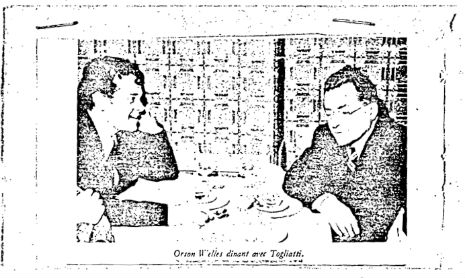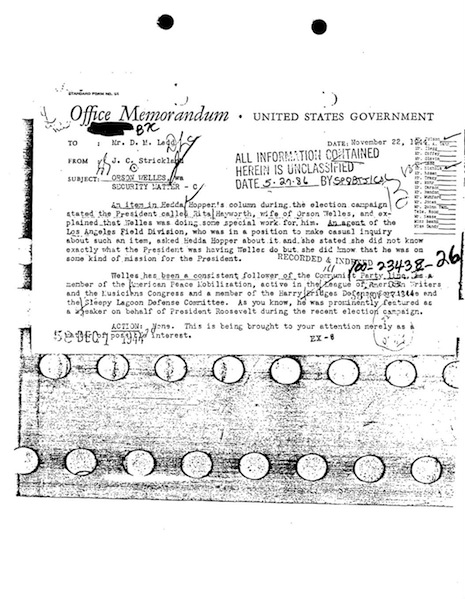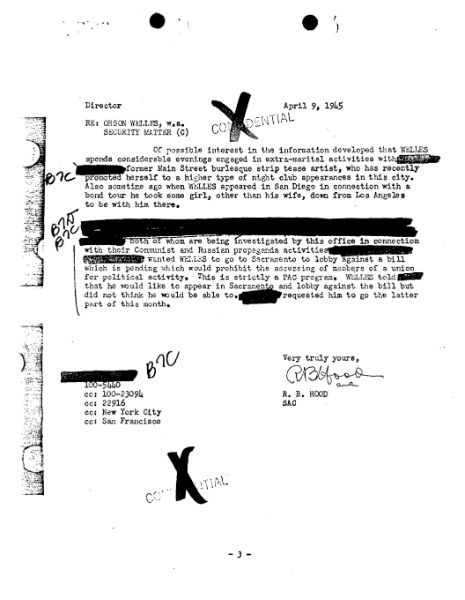
From 1941 until 1949, Orson Welles, director of Citizen Kane and The Magnificent Ambersons, was a serious object of surveillance by the FBI. This is not new information; you can read about it in biographies about Welles. You can read the actual FBI file on Orson Welles on the FBI website section called “The Vault” (PDF file). It’s 194 pages long, contains a great many documents from different places and times. Once you get used to the bureaucratic throat-clearing, it makes for very diverting reading.
It’s not stated in so many words, but Welles seems to have become a subject of FBI interest after Citizen Kane was made. William Randolph Hearst, thinly disguised subject of the movie, was friendly with J. Edgar Hoover. As is well known, Hearst mobilized his vast network of newspapers against Welles after the movie was released. To judge by the nomadic second half of Welles’ career, which he spent mostly in Europe and in which he made many literary adaptations on a low budget, it’s reasonable to posit that Hearst’s campaign against Welles had some success.
Little of that is in the file, however. To read the file is to be transported back into the pages of a James Ellroy novel, perhaps The Big Nowhere (that one’s my favorite) in which powerful wealthy white men deploy scandal and innuendo in order to defend their increasingly unhinged vision of American empire.
Most of the material pertains to two periods, 1941/42 and 1945. Welles’ association with various left-wing organizations is described in portentous terms. It is reasonably clear that Welles was left-leaning and lent his name to a great many organizations deemed subversive by the federal authorities, but that he was not a particularly organized political thinker and probably never joined the Communist Party.
What is so fascinating in retrospect is that many of the actions held against him do not appear to be very objectionable in the clear light of day. Two examples of this.
On page 48 his membership in the Negro Cultural Committee is discussed. The group is ominously described as a pro-Communist organization, but one of the charges leveled against it is: “The Negro Cultural Committee was reportedly a group organized by the Communist Party for the purpose of agitating in favor of anti-lynching bills.” That’s right—if you are the member of a race that is the systematic target of violent terrorist activity and you try to organize against it, then you are suspicious in the eyes of the FBI.
A page later we read the following: “An article appearing in the New York Times for January 17, 1939, stated that Welles was among the signers of a petition protesting the dismissal of 1500 employees of the WPA Federal Arts Project.” Again—if you belong to an interest group affected adversely by a decision made by the federal government, and you sign a petition protesting this, then you might be labeled a subversive. Eighty years later, it’s difficult to see why either of these two activities should be considered especially noteworthy.
In 1945 you can see the hysteria of the Red Scare cranking into gear. Welles’ support of the UN is held against him, and several times it is mentioned as a point of some interest that Welles undertook some travel for, or otherwise was working at the behest of Franklin Roosevelt, who, let’s remember, was the president of the United States at the time. Similarly, wartime activities in support of the USSR—at the time an ally of the United States in the global conflict known as “World War II” against Nazi Germany—that’s also used as evidence that Welles is probably a subversive.
There’s a bit of business involving Hedda Hopper and Welles’ increasingly estranged wife Rita Hayworth—there’s a good deal of talk of informants revealing this or that, a group that apparently includes Hayworth. On page 90 there is mention of of “extra-marital activities with [REDACTED] former Main Street burlesque strip tease artist.” Those of a salacious cast of mind are recommended to go to this series of pages first.
On page 119 (1949) a memo glumly admits that “In view of the fact that WELLES has never been placed as a member of the Communist Party by confidential informants of this office,” it is time to seriously consider “cancellation of his Security Index Card,” which I think means that they’re going to stop treating Welles as an active subject. A few pages later this recommendation is approved.
Sigh. After the PATRIOT Act was passed into law, there were ample stories that it was being used against, among other people, harmless left-wing activists in New England. Given the fates of Chelsea Manning, Edward Snowden, and Aaron Swartz as well as the spate of shocking recent stories about the breadth of NSA surveillance, it seems safe to conclude that the age of federal agency files of this type is far from overwith.


via Cinephilia and Beyond
Previously on Dangerous Minds:
Orson Welles: Trashing Rosebud In Paris
Orson Welles hated Woody Allen